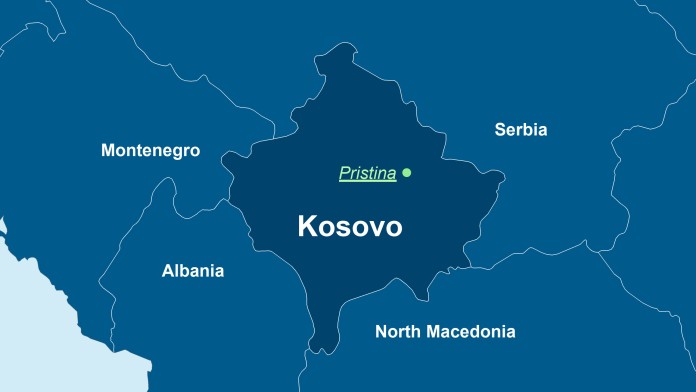
As of: 10/2022
The project is connecting the district heating system of Pristina with the thermal power plant Kosovo B, which is transformed into a co-generation plant. Instead of burning fuel oil with high emissions, the waste steam of the power plant is used to generate district heating.
The district heating company of Pristina Termokos had faced severe challenges in providing the citizens and businesses with district heating service in the cold winter months. The heat was generated based on imported heavy fuel oil, the prices of which had skyrocketed over the years. Being unable to generate sufficient income to cover imports of heavy fuel oil, district heating service was provided only for 4-6 hours per day over few weeks of winter.
The German Financial Cooperation (FC) project through KfW addressed these shortcomings by connecting the district heating system of Pristina with the thermal power plant Kosovo B, which is transformed into a co-generation plant. Hence, instead of burning highly expensive heavy fuel oil with high emissions, the waste steam of the power plant is used to generate district heating.
The project idea for transforming the thermal power plant into a co-generation plant dates back to the 80-ies, the early days of district heating service in Kosovo. Nonetheless, due to lack of funding, the project could be implemented almost 30 years later. This is the single largest investment in the district heating sector in Kosovo, which was only enabled through pooling of funds from different donors. Total financing amounted to EUR 37,3 million provided by German FC, the European Union, Sweden, Luxembourg and own contribution of Kosovo. Contributions of the donors were managed through KfW.
The project comprised construction of a heat extraction station at the thermal power plant, construction of a 12 km transmission pipeline from the thermal power plant to Pristina as well as the construction of a heat receiving station at the premises of Termokos. Furthermore, due to limited funds available, the project could cover only rehabilitation and/or replacement of critical parts of the district heating network and substations. Key components of the project were completed end of November 2014.
Since winter season 2014/2015, Termokos has been providing heating services based on co-generation to around 70,000 connected customers. The positive impact on living conditions and environment is unprecedented: For the first time in 30 years, district heating service is provided continuously 24/7 for entire heating season at much lower cost. The tremendous improvement of services translated into a steep increase in billing and collection by 176% and 570% , respectively. Accordingly, Termokos did not take any more subsidies from the government of Kosovo and Pristina Municipality (EUR 3.5 million p.a. before the project) and started operating with profits. Furthermore, by not burning heavy fuel oil for heating purposes, CO2 savings of more than 80,000 tons per year were achieved.
However, the demand for new district heating connections exceeds by far the existing capacities. Hence, in order to ensure cost-efficiency and transparency, as well as technical and financial sustainability, KfW supported the development of a long-term Masterplan, which shall serve as the sole basis for future investments into the district heating network of Pristina. Primary objective of the Masterplan is reduction of CO2 emissions at least cost and with this reduction of local air pollution in Pristina. Priority network rehabilitation and expansion deriving from the Masterplan are the focus of an ongoing project financed with grant funds of the German FC, the Grand Duchy of Luxembourg as well as an own contribution of Pristina Municipality. A total of 4,000 new connections or approx. 20,000 customers shall be connected to the district heating system within this project.
With the a.m. project, the co-generation capacity of 140 MW will be utilized fully. However, major parts of Pristina will still not be covered by the district heating network. Existing alternatives for heating such as electricity, wood and/or lignite stoves are neither financially nor environmentally viable. Hence, based on proven examples in Denmark and Austria, KfW supported a feasibility study aimed at exploring the possibilities of integrating solar energy into the district heating system in Pristina. The study paved the way for a new project in the area of solar district heating. In a nutshell, the study recommends installation of 58,000 m2 solar collectors with a generation capacity of 35 GWh/year. The heat from the solar collectors shall be stored in a 410,000 m3 pit storage and used in the wintertime to cover the demand of additionally 38,000 new customers. The storage brings additional benefits as it shall be used also to store and optimize heat from the existing co-generation system, increasing thus the output of the new technology to around 50-70 GWh/year. It is the first large-scale solar thermal project in Kosovo and Southeast Europe and hence has blue-print character for the entire region.
Solar District Heating is part of a new programme under Financial Cooperation with Kosovo called Solar4Kosovo. Besides Solar District Heating, Solar4Kosovo comprises also a Photovoltaic Power project, to be implemented at former ash dump fields of the thermal power plant Kosovo A. The Program is currently under preparation with total estimated cost amounting to around EUR 190 million. The German government has already committed EUR 60,6 million as grants and loans for Solar4Kosovo. The remaining part of the financing shall be covered through financial contributions of the Government of Kosovo as well as co-financing by other donors and International Financial Institutions.
The project contributes to the achievement of these following United Nations Sustainable Development Goals:
KfW Group
KfW Development Bank
KfW Office Pristina
+383-38-22 41 41
Share page
To share the content of this page with your network, click on one of the icons below.
Note on data protection: When you share content, your personal data is transferred to the selected network.
Data protection
Alternatively, you can also copy the short link: kfw-entwicklungsbank.de/s/enzBY1kQ
Copy link Link copied